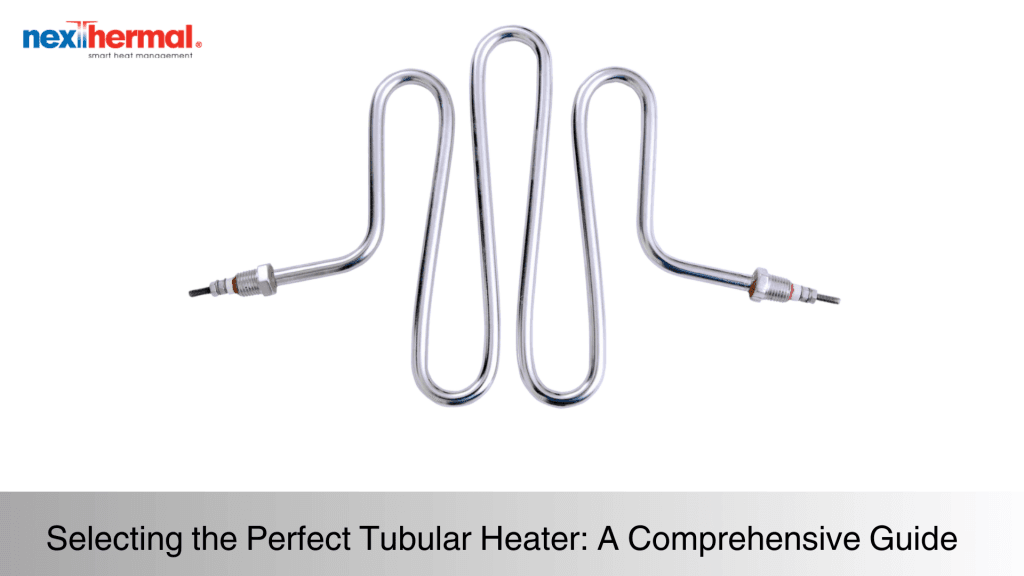Nexthermal’s Expert Guide to Selecting the Right Immersion Heater
Immersion heaters are essential components in various industrial and commercial applications where liquids or gases need to be heated efficiently and reliably. These heaters are designed to be directly immersed in the medium they are heating, ensuring rapid and uniform heat transfer. In this article, we will explore the different types of immersion heaters, their applications, and key factors to consider when choosing the right one for your needs.
1. What are Immersion Heaters?
Immersion heaters are electric heating devices designed to heat fluids, including water, oils, chemicals, and gases. They work by converting electrical energy into heat, which is transferred directly to the medium. Immersion heaters are commonly used in industries such as chemical processing, food and beverage, pharmaceutical, and manufacturing.
2. Types of Immersion Heaters
- Flanged Immersion Heaters: These are mounted through a flange, making them suitable for large-scale industrial applications. They are ideal for heating water, oils, and chemicals in tanks and pressure vessels.
- Screw Plug Immersion Heaters: These heaters are screwed into a threaded opening and are commonly used in small to medium-sized tanks and industrial processes.
- Over-the-Side Immersion Heaters: Designed to hang over the side of a tank, these heaters are perfect for applications where tank access is limited or when permanent installation is not feasible.
- Circulation Heaters: These heaters are installed in a pipeline system, heating the fluid as it flows through the heater chamber. They are often used in oil and gas processing.
- Quartz and Teflon Immersion Heaters: These are specifically designed for corrosive environments, such as in chemical processing industries.
3. Applications of Immersion Heaters
Immersion heaters are used across a wide range of industries, including:
- Water Heating: Commonly used in boilers, water tanks, and storage units.
- Oil Heating: Ideal for preheating oils in industrial equipment and machinery.
- Chemical Processing: Used for maintaining specific temperatures in chemical tanks.
- Food and Beverage Industry: Ensures precise heating in food processing equipment.
- Pharmaceutical Industry: Helps maintain strict temperature controls in drug manufacturing.
- HVAC Systems: Used for heating air and fluids in heating, ventilation, and air conditioning systems.
4. How to Choose the Right Immersion Heater
When selecting an immersion heater, several factors must be considered to ensure it meets your specific requirements:
- Medium to be Heated: Different fluids require specific materials for heater construction. For example, stainless steel heaters are ideal for water, while Incoloy or Teflon heaters are better suited for corrosive chemicals.
- Temperature Requirements: Ensure the heater can reach and maintain the desired operating temperature without overheating.
- Wattage and Power Requirements: Determine the required power output based on the volume and type of fluid being heated.
- Tank Size and Heater Configuration: Choose a heater that fits your tank size and installation constraints.
- Environmental Factors: Consider the operating environment, such as humidity, exposure to chemicals, or potential for explosive gases.
- Safety Features: Look for built-in safety features like temperature control, overheat protection, and explosion-proof designs.
5. Benefits of Immersion Heaters
- Efficient Heating: Direct immersion ensures quick and uniform heat transfer.
- Cost-Effective: Reduced energy waste compared to indirect heating methods.
- Versatile Applications: Suitable for a wide range of fluids and industrial processes.
- Easy Installation: Available in various mounting options for seamless integration.
- Durable and Long-Lasting: Made from robust materials for extended service life.
6. Maintenance Tips for Immersion Heaters
Regular maintenance is crucial to ensure the longevity and efficiency of immersion heaters:
- Periodically inspect for signs of corrosion or scaling.
- Clean the heater elements to prevent buildup.
- Ensure proper wiring and connections.
- Use temperature controls and limiters to prevent overheating.
- Follow manufacturer guidelines for routine maintenance.
7. Why Choose Nexthermal for Immersion Heaters?
At Nexthermal, we specialize in designing and manufacturing high-quality immersion heaters tailored to diverse industrial requirements. Our heaters are built using premium materials and advanced technologies, ensuring optimal performance, energy efficiency, and long-lasting durability.
Conclusion
Immersion heaters are indispensable in industries requiring precise temperature control and efficient fluid heating. By understanding the types, applications, and selection criteria, businesses can make informed decisions to improve efficiency and reduce operational costs. Partnering with a reliable provider like Nexthermal ensures you receive top-quality immersion heaters designed to meet your specific requirements.
For more information about our immersion heaters, visit Nexthermal’s Tubular Heaters page.





